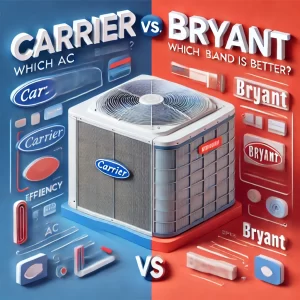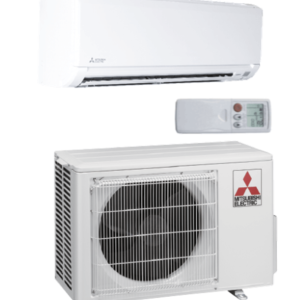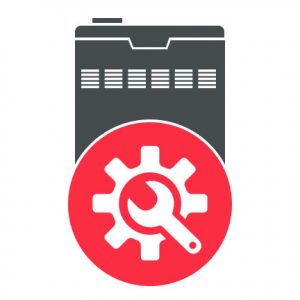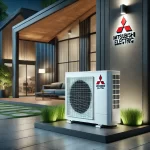Heat Pump vs. Central Air Conditioning
Heat Pump vs. Central Air Conditioning: Which One Is Best for Your Home?
When choosing a home cooling system, many homeowners find themselves deciding between a heat pump and a central air conditioner. While both systems provide cooling, they work differently and have unique advantages depending on climate, energy efficiency, and heating needs.
So, which one is best for your home? In this guide, we’ll compare heat pumps and central air conditioning systems, explore their pros and cons, and help you make an informed decision.
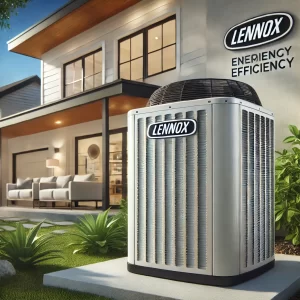
1. What’s the Difference Between a Heat Pump and a Central AC?
What Is a Heat Pump?
A heat pump is a two-in-one system that provides both cooling and heating. It works by transferring heat from one place to another:
- In the summer, it pulls heat from inside your home and releases it outdoors (just like an AC).
- In the winter, it reverses the process, pulling heat from outside air and bringing it indoors.
Key Benefit: A heat pump can replace both an air conditioner and a furnace, making it an all-in-one solution.
What Is a Central Air Conditioner?
A central air conditioning system only provides cooling. It works by removing heat from your home and expelling it outdoors, while a separate heating system (like a furnace) provides warmth in the winter.
Key Benefit: Central AC is a great option in hot climates where heating is not a major concern.
2. Key Differences Between Heat Pumps and Central Air Conditioning
| Feature | Heat Pump | Central AC |
|---|---|---|
| Cooling Ability | Same as AC | Same as heat pump |
| Heating Ability | Yes, heats in winter | No, requires separate furnace |
| Energy Efficiency | More efficient in mild winters | Best for areas with cold winters |
| Installation Cost | Slightly higher | Lower initial cost |
| Lifespan | 10–15 years | 15–20 years |
| Best For | Mild to moderate climates | Hot summers and cold winters |
3. Pros and Cons of Heat Pumps vs. Central AC
✔ Pros of a Heat Pump
✅ Provides Heating & Cooling – Eliminates the need for a separate furnace.
✅ Energy Efficient – Uses electricity and can reduce heating costs in mild climates.
✅ Eco-Friendly – Reduces carbon emissions compared to gas furnaces.
✅ Lower Operating Costs – Can be cheaper than gas heating in areas with mild winters.
❌ Cons of a Heat Pump
❌ Less Efficient in Cold Climates – Struggles in temperatures below 30°F.
❌ Higher Upfront Cost – Costs more to install than central AC.
❌ More Wear & Tear – Runs year-round, leading to a shorter lifespan (10-15 years).
✔ Pros of Central Air Conditioning
✅ More Durable – Lasts longer (15-20 years) because it only runs in summer.
✅ Better for Cold Climates – Works with a gas furnace for more efficient heating in winter.
✅ Lower Initial Cost – Typically cheaper to install than a heat pump.
❌ Cons of Central Air Conditioning
❌ Only Cools – Requires a separate heating system, increasing costs.
❌ Less Energy Efficient – A gas furnace can be expensive to run in winter.
4. Which One Is Right for Your Home?
Choose a Heat Pump If:
✅ You live in a mild to moderate climate (winter temperatures rarely drop below 30°F).
✅ You want one system for both heating and cooling.
✅ You prefer an energy-efficient, eco-friendly option.
✅ Your home doesn’t have access to natural gas for heating.
Choose Central AC If:
✅ You live in a cold climate where winters are harsh.
✅ Your home already has a gas furnace for efficient heating.
✅ You want a system with a longer lifespan (since ACs last longer than heat pumps).
✅ You’re looking for a lower initial installation cost.
5. Cost Comparison: Heat Pump vs. Central AC
| Cost Factor | Heat Pump | Central AC |
|---|---|---|
| Unit Cost | $4,000 – $10,000 | $3,000 – $7,000 |
| Installation Cost | $5,500 – $12,500 | $4,000 – $9,000 |
| Annual Energy Cost | $600 – $1,200 | $700 – $1,500 (with furnace) |
| Lifespan | 10 – 15 years | 15 – 20 years |
Sources: Energy.gov, HomeAdvisor, Consumer Reports
Although heat pumps have higher upfront costs, they can save money on heating bills in mild climates. However, central AC is often a better investment in regions with freezing winters.
6. Additional Factors to Consider
A. Climate Matters
- Mild Climates (Southern U.S., Coastal Areas) → Heat pumps are ideal.
- Cold Climates (Northern U.S., Midwest, Canada) → Central AC + furnace is the better choice.
B. Energy Efficiency & SEER Ratings
Both heat pumps and central AC units come with a SEER rating (Seasonal Energy Efficiency Ratio).
- The higher the SEER rating, the more efficient the system.
- Look for 16 SEER or higher for maximum savings.
C. Tax Credits & Rebates
Heat pumps often qualify for federal and state tax credits because they are more energy-efficient. Check with:
- Energy Star
- Your local utility provider for rebates.
D. Installation Quality Matters
No matter which system you choose, a proper installation is key to efficiency and longevity.
✔ Hire a licensed and experienced HVAC contractor.
✔ Read customer reviews before selecting an installer.
✔ Get multiple quotes to compare pricing and options.
7. Final Verdict: Heat Pump vs. Central AC – Which One Wins?
| Feature | Winner |
|---|---|
| Best for Year-Round Use | Heat Pump |
| Best for Cold Climates | Central AC + Furnace |
| Most Energy Efficient | Heat Pump |
| Lower Upfront Cost | Central AC |
| Longest Lifespan | Central AC |
Our Recommendation:
- If you live in a mild to warm climate, a heat pump is the better choice because it provides efficient heating and cooling.
- If you live in a cold climate, central AC with a gas furnace is the smarter option for reliable winter heating.
Need Help Choosing the Right System?
Still not sure whether a heat pump or central AC is best for your home? Contact a local HVAC expert for a free consultation and estimate.


